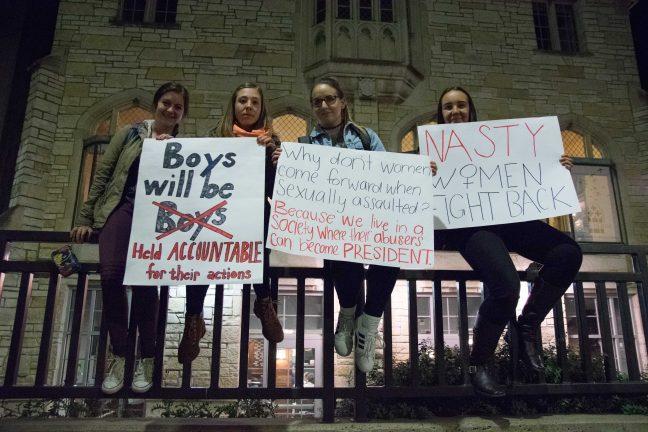Despite Wisconsin lawmakers currently making permanent rules to conform to the Trump Administration’s Title IX policy changes — which, among other things, narrowed the Title IX definition of sexual harassment — the University of Wisconsin’s sexual harassment policy will remain relatively unchanged, according to UW’s Title IX director Lauren Hasselbacher.
In addition to other changes, former President Trump’s Title IX regulations narrowed the definition of sexual assault, raised the standard of proof for sexual harassment and required live cross-examinations for sexual harassment hearings, according to the Wisconsin State Journal.
But Title IX only dictates what types of misconduct fall under the Department of Education’s authority, meaning schools and universities are still free to create policies going beyond Title IX’s scope, according to Hasselbacher.
In a UW News article, UW said they will maintain its broader policy scope.
“Ultimately, we [the UW System] applied the federal rules to their narrower scope of conduct,” Hasselbacher said. “And in the cases of the broader range of conduct that our policy continues to address, we adopted the rules where they made sense and declined to adopt them where we believed they didn’t suit our community.”
One example of the UW System’s latitude, according to Hasselbacher, was the decision to continue its policy of investigating off-campus incidents of sexual harassment, despite the new Title IX rules dictating universities only need pursue incidents which occurred on campus.
Proposed Title IX changes could affect how colleges deal with dating violence
Hasselbacher said the UW System concluded this lowered requirement didn’t meet the expectations of its community.
The UW-Madison Office of Compliance stated it will still investigate cases of sexual harassment meeting the previous Title IX’s “preponderance of the evidence” standard of proof.
According to Wisconsin’s emergency rule altering the Title IX rules, this means the alleged misconduct is more likely true than not true — a lower standard than the new Title IX’s clear and convincing evidence.
“The initial contact and interaction with our office — in terms of seeking support services — has really not changed and we would encourage people to reach out if they need referrals, academic assistance or protective measures,” Hasselbacher said. “The formal investigation process has changed in some aspects — in terms of what may come in a typical hearing, each party’s right in that process — but that’s something we would go over with each individual before each investigation.”
Under the new rules, Title IX sexual harassment hearings now require a live cross-examination between the complainant and the accused, according to the emergency rule.
This new measure proved controversial. In a Washington Post opinion article, University of Michigan sociology professors Sandra R. Levitsky and Elizabeth A. Armstrong criticized it for unnecessarily re-traumatizing sexual assault survivors. Others, such as Trump’s Department of Education, defended it as necessary for due process.
Not all cases of Title IX sexual harassment need to proceed to a Title IX hearing, according to the emergency rule.
UW institutions have the discretion to use their own investigations and disciplinary measures, which don’t require live cross-examinations, according to the emergency rule. Moreover, survivors can also pursue other informal interventions, Hasselbacher said.
In an email to The Badger Herald, University Health Services Violence Prevention Manager Molly Zemke stressed the importance of seeking help if one experiences sexual harassment.
Citing a 2019 Association of American Universities survey, Zemke said many students don’t report sexual harassment because they don’t believe the incident was serious enough. Zemke said UHS will still believe and support these students — even if they don’t pursue an investigation.
In addition to UHS, there is a variety of university and student organizations offering confidential help to survivors of sexual harassment, Zemke said. Their services range from victim advocacy and counseling to medical interventions and forensics.
“Campus community members should be aware of the resources that are available for survivors,” Zemke said. “Especially the confidential resources provided by UHS.”
Getting ICE involved in sexual assault cases targets victims as well as perpetrators
UNIDOS Outreach Coordinator Manuel Cerda said another barrier some survivors face in reporting sexual harassment is language. For example, Cerda said if a survivor doesn’t have a strong command of English but their assailant does, the assailant can persuade authorities nothing happened.
According to Hasselbacher, the university would use the Cultural Linguistic Service to translate in cases of sexual harassment where the survivor doesn’t speak English.
“Our program strives to be equally accessible to all members of our campus,” Hasselbacher said. “And everyone — regardless of sexual orientation, gender or any other identity — has a right to access our services”
In response to President Biden’s recent executive order changing Title IX rules, Hasselbacher said UW is still reviewing the changes.













